You are here
Back to topPMA Fresh Connections China: Discovering China's New Retail Landscape
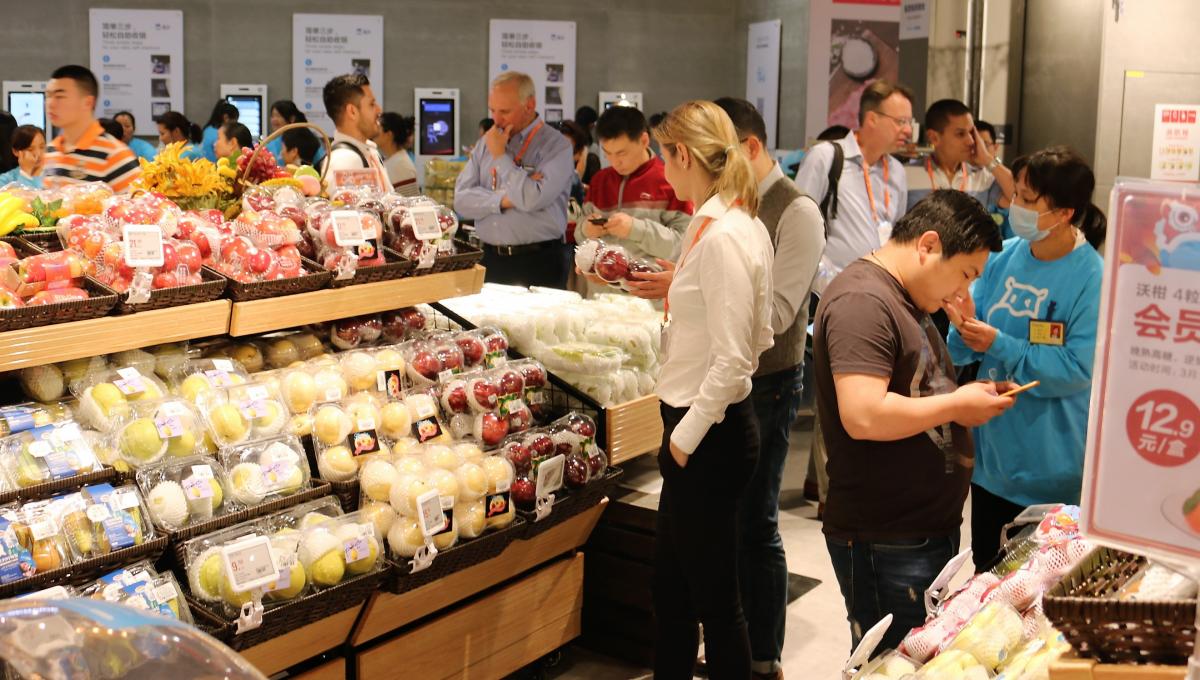
Exploring the fresh fruit section at a Hema Fresh supermarket.
The group of more than 50 international entered the Super Species supermarket outlet on March 20 in Shenzhen and made a beeline for the fruit—peering, sniffing, poking and exclaiming in a manner that seemed extreme even among China’s most fruit-fanatic consumers.
The explanation for this odd sight was that visitors were fruit industry leaders from around the world who were on a retail tour as part of the PMA Fresh Connections: China conference that would be held in Shenzhen on the following day. Aside from visiting Super Species, which is owned by Chinese retailer Yonghui Superstores, the group also visited an outlet of the Hema supermarket chain owned by ecommerce giant Alibaba.
Super Species, Hema and other new brands like 7Fresh from JD.com and Huixuan from Walmart are all relatively freshly established and are all competing against each other to grab a slice of China’s “new retail,” a term popularized by Alibaba founder Jack Ma. Ultimately, they are vying to be nationwide replacements for traditional wet markets for urban consumers’ daily food shopping needs in a country where many people have relatively small refrigerators and must make frequent shopping trips for fresh produce.

In addition to creating smaller stores that are more conveniently laid out than hypermarkets, the new retail brands hope to lure consumers away from wet markets and become market leaders through a heavy focus on using technology to better understand consumer behaviors and preferences and to speed up and streamline their daily shopping experience.
These brands all include online ordering with free delivery to customers within a 2 or 3 radius, usually within 30 minutes. This allows the store itself to serve as a small delivery warehouse within each neighborhood. Many also offer dining areas with fresh cooked food, and in some cases even small bars with craft beers on tap.
If you want to go take a look at the websites for these supermarkets, you can mostly forget about it: marketing, ordering and customer support is mostly accomplished through standalone phone apps or mini-programs within the ubiquitous WeChat mobile messaging app.
“All of our Fresh produce is pre-packaged in small portions, for example, for fruit, two or three pieces per package, which constitutes a daily portion for family,” a representative from Hema told the attendees at the Fresh Connections. “We want to encourage consumers to purchase smaller amounts more frequently to increase freshness. We have a unified online and offline experience, with uniform quality standard for all of our products, which means that customers purchasing in the shop and those ordering delivery to their home will receive similar size, shape and color of fresh produce.”
The following is an overview of four promising ‘new retail’ brands in China:
 Hema (盒马)
Hema (盒马)
Ownership: 100% owned by Alibaba Group
Launched in: 2016
Number of outlets: 40 (as of April 2018)
Store size: ~4,000-6,000 sqm
Geographic distribution: Shanghai, Beijing, Shenzhen, Suzhou, Hangzhou, Ningbo, Guangzhou, Chengdu, Fuzhou, Guiyang
Technology highlight: When an online delivery order is placed, employees in the fresh produce section can quickly bag the items ordered by the customer, hang the bag on a hook, and the bag will be automatically whisked by motorized track to the back of the store to be picked up by the delivery driver, who will take it to the customers’ doorstep by electric scooter.

 Super Species (超级物种)
Super Species (超级物种)
Ownership: Yonghui Superstores (which, in turn, has minority investment from messaging, social media and digital payment giant Tencent as well as ecommerce giant JD.com). Yonghui also has another small format supermarket brand, YH, which are slightly less high-end and slightly larger in size compared to Super Species.
Launched in: 2017
Number of outlets: 34 (as of March 2018)
Store Size: Typically, under 1,000 sqm
Geographic distribution: Fuzhou, Xiamen, Shenzhou, Nanjing, Hangzhou, Beijing, Shanghai, Chengdu, Chongqing, Yangzhou,
Technology highlight: Every SKU in the store has a separate QR code that is scannable by Tencent’s WeChat app. At the time Produce Report tested some QR codes during the PMA Fresh Connections tour at one of the Super Species outlets in Shenzhen, we received an error message saying this feature was not yet supported at this outlet. However, it appears to be a system for allowing customers to see information like product origin, recipe ideas, nutrition facts and the like directly on their phones as they shop.
 7Fresh:
7Fresh:
Ownership: JD.com
Launched in: 2017
Number of outlets: 2 (as of April 2018)
Store size: 2,600-4,000 sqm
Geographic distribution: Beijing
Technology highlight: When customers submit orders online, JD’s algorithms automatically calculate the sequence in which the in-store order picker should bag items to result in the least amount of walking and fastest gathering of the customer’s order.
Read more:
JD in “Mad Rush” to Establish National Presence for its 7Fresh Supermarket Brand
JD.com and Yiguo to exhibit at ASIA FRUIT LOGISTICA
 Walmart ‘Huixuan’ (沃尔玛惠选)
Walmart ‘Huixuan’ (沃尔玛惠选)
Ownership: Walmart (China). Delivery fulfillment is being done by JD’s ‘Daojia’ delivery service. Walmart owns a significant passive stake in JD.
Launched in: 2018
Number of outlets: 1 (as of April 2018)
Store size: ~1,200 sqm
Geographic distribution: Shenzhen
Technology highlight: Walmart Huixuan stores feature an app-based shopping system that will allow customers to bypass checkout by scanning items with their phones as they add them to their shopping carts or baskets, and then paying via their phones as they exit the store. According to Walmart, during previous trial runs of this ‘scan and go’ payment system in a portion of its Shenzhen hypermarkets, 30% of customers tried the system, 95% of whom said they would use it again in the future.
Read more:
Walmart Opens ‘Smart’ Small Format Supermarket in Shenzhen




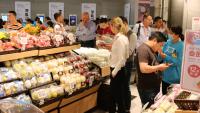
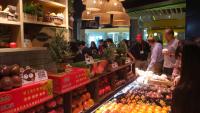

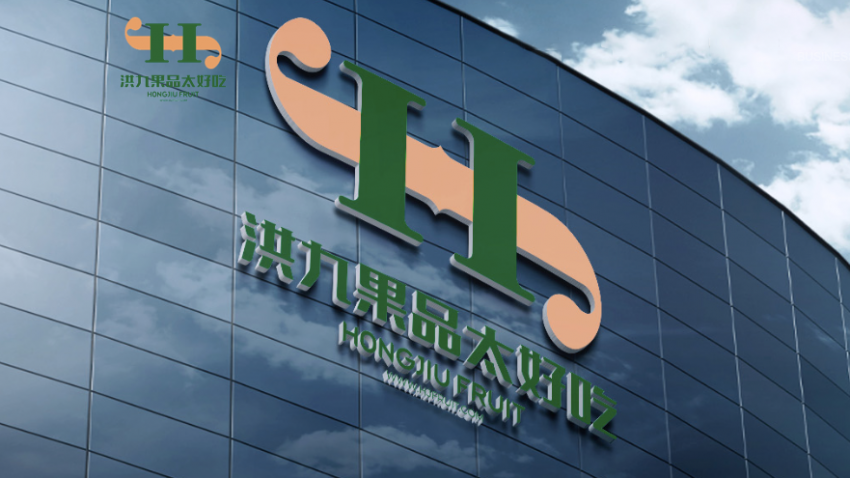
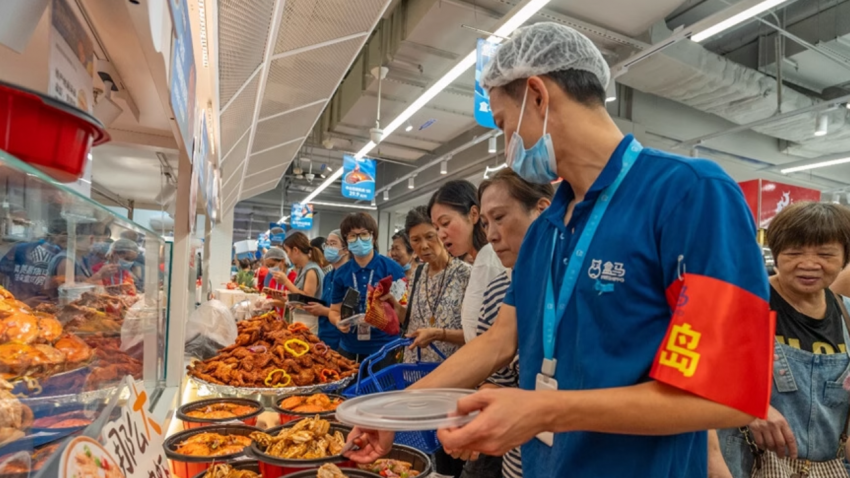
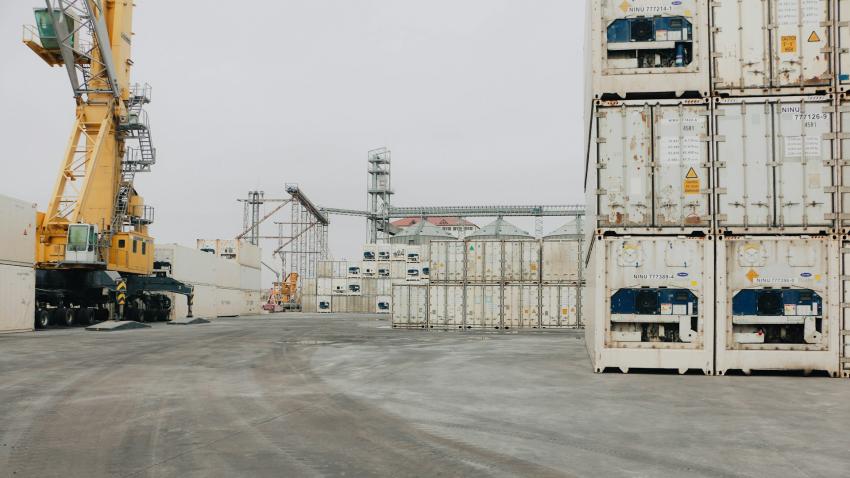









Add new comment